Press Release
Brussels October 7, The Supreme Court of Nepal has upheld the decision of the Jumla High Court, affirming his one-year imprisonment for proselytizing.
This decision by the Supreme Court sheds light on the concerning direction Nepal is taking, suppressing religious minorities and individuals with beliefs diverging from Hinduism. The introduced Section 158 in Nepal’s penal code criminalizes converting or attempting to convert another person.
The Supreme Court of Nepal has upheld the decision of the Jumla High Court, affirming his one-year imprisonment for proselytizing.
This decision by the Supreme Court sheds light on the concerning direction Nepal is taking, suppressing religious minorities and individuals with beliefs diverging from Hinduism. The introduced Section 158 in Nepal’s penal code criminalizes converting or attempting to convert another person.
The Supreme Court’s affirmation of the sentence carries profound implications for religious freedom in Nepal. It indicates that it could incriminate people who share their faith or enter into conversations about their religion. It could also become dangerous to accommodate persons requesting more information regarding a religion or persons who are requesting assistance for their conversion.

Pastor Keshav Acharya’s legal journey began with his arrest on March 23, 2020, on charges associated with proselytizing, including sharing the gospel and offering prayers for the healing of fellow citizens on YouTube who were affected by COVID-19. Subsequently, he faced further arrests on allegations of attempting to convert Hindus to Christianity. On November 30, 2021, the District Court in Dolpa sentenced him to a two-year imprisonment term. The Jumla High Court later reduced the sentence to one year on July 13, 2022, citing a violation of Nepal’s anti-conversion law.
Nepal, a nation known for its diversity, enshrines the right to freedom of religion in its Constitution, acknowledging its multi-ethnic, multilingual, multi-religious, and multicultural population. The decision to criminalize and punish Pastor Keshav Acharya for religious activities within the confines of one’s belief, under Section 158 of the National Penal Code, contradicts the fundamental rights guaranteed by the Constitution of Nepal, the Universal Declaration of Human Rights 1948, and Article 27 of the International Covenant on Civil and Political Rights.
In his appeal, pastor Keshav explained that carrying videos and religious materials and sharing these does not undermine the religion of another person and does not necessarily have the intent to convert another person. He also stated in his appeal that criminalizing and punishing him for practicing his own religion and following Christian rituals is contrary to the right to religious freedom enshrined in both the Nepali constitution and International conventions mentioned above.
Jubilee Campaign is concerned and strongly urging the Nepalese Parliament to repeal Section 158(1) and (2) of the National Penal Code Act, 2017, which criminalizes religious conversion and proselytism. This call is based on the belief that these sections violate international human rights standards, particularly the right to religious freedom.
Expressing shock at the Supreme Court’s decision, Pastor Kashev’s lawyer, Indra Aryal, emphasized the disregard for grounds presented in the appeal petition. He voiced concerns that the decision appeared to curtail religious freedom and freedom of expression, particularly for religious minorities, and highlighted the apparent flaws in the legal process.

Joseph Jansen, advocacy officer at Jubilee Campaign Netherlands, stressed that Pastor Keshav Acharya did not coerce individuals to convert to Christianity but was exercising his fundamental right to freedom of religion. He urged Nepalese authorities to respect religious freedom and remove government restrictions related to religion, aligning with human rights norms.
The judgment has deeply affected Pastor Keshav Acharya and his family, who assert vehemently that he did not commit any crime. They grapple with the emotional and psychological impact of the decision and the looming fear of Pastor Keshav’s potential arrest and one year imprisonment.
Junu Acharya, Pastor Keshav’s wife, expressed profound disturbance and heartbreak over the Supreme Court’s decision. She viewed the legal investigations and legal process as discriminatory and biased.
Pastor Keshav Acharya conveyed his deep sadness about the judgment, reiterating that his actions were driven by faith and a desire to spread love and blessings. He remains hopeful for a just reconsideration of his case, strongly believing in his innocence.


